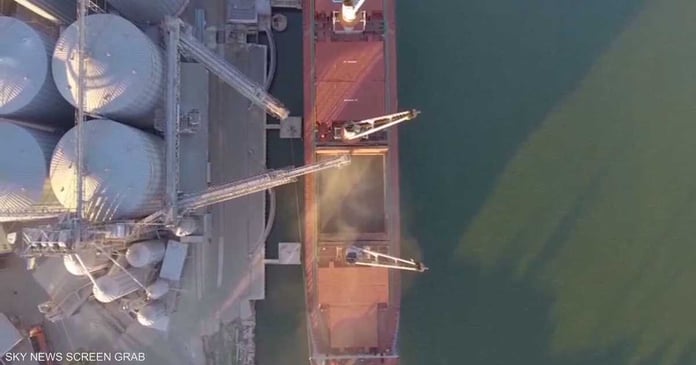Ukraine’s Black Sea ports were blocked after the outbreak of the Russian-Ukrainian war last year, but access to three of them was granted in July as part of a deal between Moscow and Kiev negotiated by the United Nations and Turkey.
UN Under-Secretary-General for Humanitarian Affairs Martin Griffiths said efforts are currently underway to extend the grain export agreement, stressing that “continuation of the initiative is crucial…We will continue to call on everyone to fulfill their responsibilities while the world watches us closely.”
The United Nations revealed that the last two ships will leave Ukrainian ports on Tuesday, in accordance with the previous agreement.
Parties to the deal held a meeting on its future last week in Istanbul, but Moscow has given no ‘green light’ on the future of the deal, which the world is pinning hopes on to avert a crisis eating.
Cereal offer details
The Black Sea Grain Initiative, the official name of the agreement on grain exports from Ukrainian ports, stems from a July 22 agreement between Russia, the United Nations, Turkey and Ukraine. This initiative has helped alleviate the global food crisis caused by the war between Russia and Ukraine. Under the agreement, vessels to and from Ukraine are inspected in Turkish waters, and the four parties work together to approve and inspect vessels sailing under the agreement. The deal allowed about 30 million metric tons of grain and foodstuffs to be exported from Ukraine under the deal, after war prevented ships from leaving Ukrainian ports. The United Nations also said the deal had helped reduce world prices by around 20% compared to last year. Additionally, wheat prices hit their lowest level since July 2021. Wed, which the United Nations is pushing for. While Russian food and fertilizer exports are not subject to Western sanctions imposed after the invasion of Ukraine in February 2022, Moscow says restrictions on payments, logistics and insurance acted as a hindrance. to shipments.
Waiting for the “political decision”
The Russian news agency “Tass” quoted a source familiar with the negotiations as saying that the question of extending the grain agreement is being resolved at the “political level” at this stage, adding that an agreement should be found.
The source told the Russian agency: “In fact, the negotiations to extend the agreement have been completed at the technical level, but the issue is currently being resolved at the political level, and there is a good chance of extending the agreements. agreements”.
In turn, Kremlin spokesman Dmitry Peskov told reporters that Moscow has not yet decided to extend the grain export agreement with Ukraine because “there are many unanswered questions about our part of the deal”.
But he reiterated that his country “must now make a decision”.
Difficult road to an agreement
For his part, the researcher of international relations and political economy, Abu Bakr El-Deeb, in statements to “Sky News Arabia”, identified the future of the grain agreement between Russia and Ukraine in a certain number of points, saying:
- This deal has been on a rocky road since its birth in July last year, after the United Nations and Turkey negotiated its approval and the supply of grain from the world’s biggest exporting country, Ukraine.
-
The grain deal has contributed to the delivery of grain and food to many countries around the world, especially African countries, as the war has caused a humanitarian stalemate and a food crisis, as around 170 million people were exposed to the risk of starvation and lack of food. food due to the suspension of cereals from Ukraine after the outbreak of the war.
-
With the conclusion of the agreement, Russia at the time was able to carry out its agricultural exports abroad, but as the days went by, Western sanctions intensified on all aspects of economic life in Moscow, which which threatened its economy and harmed its exports.
-
All the post-sanctions factors made Russia reluctant to complete the deal, which made negotiations difficult and arduous.
-
The last ship leaves Russia tonight, and the world lays their hands on her heart; Because if Russia pulls out, the world will revert to the threat of a food crisis, but the United Nations is conducting important negotiations with all parties to try to extend the grain deal.
Read the Latest World News Today on The Eastern Herald.


